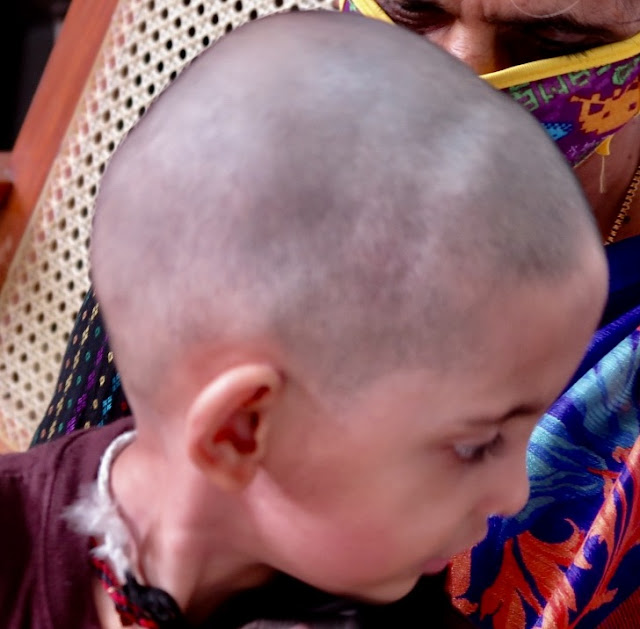I had an incidental experience of observing families and children returning from the Palani temple after shaving their head following their pilgrimage. I noticed that many children as young as two to three years old had visible prominence of the sutural lines of the skull from a distance in the bald head. This was in the year 2002.
That was also the time I observed that many children with developmental challenges, whom I examined during the consultation had palpable cranial sutures. Normally the Metopic sutures alone would close in children around two years. They were not normally palpable even after closure. The coronal, sagittal and Lamdoid sutures normally would close close between 22 and 26 years. Even after they close they are not normally palpable, when you feel them over the sutural lines.
So if sutures are palpable over the skull it would need to be due to a reason that is medically significant.
I knew that many children are taken to hair cutting saloons to shave their head sometimes before five years of age. I approached the hair dressers to look for any linear swelling over the scalp by showing the photographs of children who had sutural prominences. During the last twenty years I received feed back from hair dressers in Vellore and from my village, where I live now for the last ten years, that they observed a bump over the sutural lines in half of children whose head they shaved.
With that information, I was keen to find the prevalence of the premature closure of sutures in developmentally challenged children. I examined for this in every child I examined in the last ten years. Having examined about 16000 children in the last ten years, I feel that there is a risk of premature closure of cranial sutures in about sixty percent of developmentally challenged children in the population of children I have covered during the clinical examination.
I noticed that petals of some rose flowers in our garden are eaten by some insects.
Just as the insects slowly eats away the petals, the premature closure of cranial sutures strain the normal developmental process in children.
I had a suspicion that whether it is the deficiency of Vitamin D which is one of the factors for the premature closure of the cranial sutures in children. Having pursued that for the last ten years by measuring vitamin D level in all children who had premature cranial sutural closure, I have reasons to conclude that it might be the major causal factor. Children who received Vitamin D supplementation when they were followed up for about six months, seem to have less prominence of the sutures. The vitamin D deficiency might be causing only a fibrous union of the cranial bones, which can be undone to some extent with supplementation of vitamin D.
To pursue this further more scientifically, I submitted a proposal of a scientific study to the Institutional Review Board yesterday. A colleague encouraged me to undertake a study. Anna designed the study and prepared the power point presentation and the documents needed to be submitted. What an effort it was! I do find constraint of time as most days begin early and finish late in the evening due to increasing workload.
The implication of the study would be, it if affirms an association between premature cranial sutural closure and deficiency of Vitamin D, the expectant mothers, infants and toddlers would need estimation of Vitamin D level and supplementation if found deficient. Now-a-days, babies who are born prematurely receive vitamin D supplementation. Not other babies normally. Mothers are not tested for Vitamin D level normally.
About 80 percent of Vitamin D comes to us through exposure to sun and only 20 percent or so come from the dietary sources.
In the state whee I live, about six months the year can be cloudy due to monsoon seasons. It is during the late morning or early afternoon, the ultraviolet rays of the sun can be effective to provide the stimulus to produce Vitamin D in the body. During that time children are likely to be indoor.
I confess that it was an accidental sighting of many children, while returning after their head shaved at Palani temple, I was struck by the risk of premature closure of the cranial sutures in children. I am grateful for several hair dressers who helped to make an informal epidemiological search for the prevalence of this in healthy children. Since I welcome developmentally challenged children, I seem to have been privileged to include them in my observation and enquiry.
Twenty years on an enquiring journey!
I stay open to the outcome of this study and look forward to being a student, learning from children!
M.C.Mathew(text and photo)




No comments:
Post a Comment